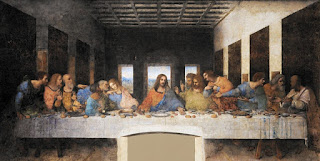ORDINARY TIME
Ordinary Time is called Tempus
Per Annum ("time throughout the year"). It is the
liturgical period outside of the distinctive liturgical seasons, in which
specific aspects of the mystery of Christ are celebrated. The days of
Ordinary Time, especially the Sundays, "are devoted to the mystery of
Christ in all its aspects.
Ordinary Time therefore runs 33 or 34
weeks, and falls between Christmas and Lent, ( the Monday following the Baptism
of the Lord, until the Tuesday before Ash Wednesday); and between Easter and
Advent, (Monday following Pentecost until the evening before Advent) .
Both online and print sources
indicate that Ordinary Time derives its name from the word ordinal,
meaning "numbered," since the Sundays of Ordinary Time, as in other
seasons, are expressed numerically. However, others suggest the etymology of
"Ordinary Time" is related to our word "ordinary" (which
itself has a connotation of time and order, derived from the Latin word ordo).
'
'
BACKGROUND TO ORDINARY TIME.
From a historical perspective, the
use of the term "Ordinary Time" was used before the Second Vatican Council,
but it was not until after the council that the term was officially used to
designate the period between Epiphany and Lent, and the period between
Pentecost and Advent. Rather than being called the "Season of Ordinary
Time," the times were called "Season After Epiphany" and
"Season After Pentecost"
After the new Catholic Calendar took
effect in 1969, these older designations were no longer used.
The liturgical colour is green
because it celebrates and symbolizes The Holy Trinity. The colour
of green is appropriate because it is the most ordinary color in our natural
environment.
The alternative name to Ordinary Time
is the Sunday of the Year. During Ordinary Time, we remember and celebrate the
parts of Jesus' life that were 'ordinary', much like our own lives. In this
way, we are able to connect with the humanity of Jesus, but always keeping in
mind His Divinity.
Ordinary time does not need to be
"ordinary," and is not meant to mean that somehow we get a break from
the Liturgical Year. The opposite is true: Ordinary Time celebrates "the
mystery of Christ in all its aspects." I like to think of Ordinary time as
an ’'extraordinary" time since it is a time given by the Church to
enhance my spiritual growth, and because it is gradual, Sunday after
Sunday, I can make progress throughout the year.
FEASTS DAYS AND ORDINARY TIME.
Many important liturgical
celebrations fall during Ordinary Time, including, the feasts of Trinity,
Corpus Christi, the Assumption of Mary, All Saints and Christ the King.
In addition, the Church continues to celebrate Saints days during the week,
including my beloved St Dominic, and other events such as The
Octave of Christian Unity. Saints days do not usually fall on Sunday,
since Sunday is the day of Resurrection- the Lord's Day.
The major feasts, when occurring on a
Sunday, supersede the regular Ordinary Time Sunday readings and liturgy. In the
Australian Catholic Church, Corpus Christi has been transferred to a Sunday, so
often there are fewer than the 33 or 34 Sundays labelled "Sundays of
Ordinary Time," although these Sundays still fall within Ordinary Time.
May your Season of Ordinary Time
be blessed with extraordinary
spiritual growth.

No comments:
Post a Comment